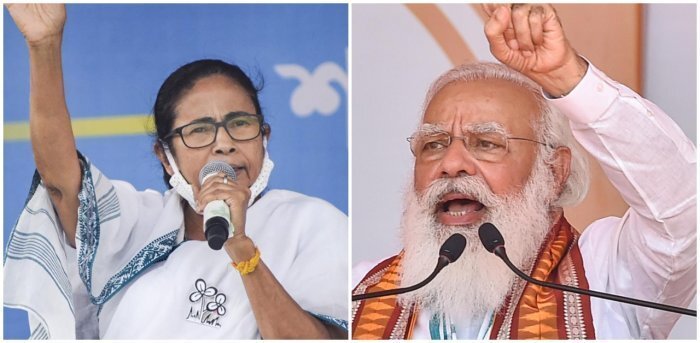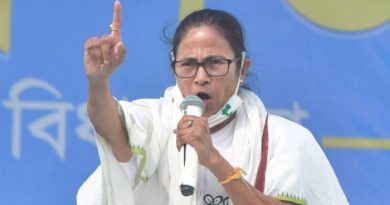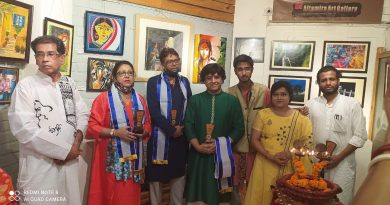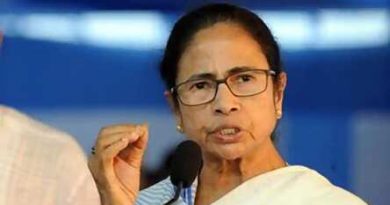| |
|---|
News Desk: The bitter battle of West Bengal is entering the crucial sixth phase as voting in 180 out of 294 assembly seats has already concluded in the last five rounds, and 43 out of the remaining 104 constituencies are going to the polls on April 22. While both the ruling TMC and the resurgent BJP exude confidence to capture the state, this phase could prove decisive for the political rivals as the electoral outcome substantially hinges on the mood of the Matua voters in the seats spread over four districts. The groundwork for which both the TMC and the BJP started way ahead of the poll announcement.

Having migrated from East Bengal after the partition and the creation of Bangladesh, the Matua Hindus are scattered across the border districts of West Bengal. But they are dominant in the assembly constituencies in North 24 Parganas and Nadia districts and significant in numbers in Purba Bardhaman and North Dinajpur districts where voters will exercise their franchise on Thursday.
Notably, with a population of around 30 million and a vote bank of approximately 15 million, the Matuas are considered a potent force to swing elections in nearly 35 assembly seats and influence another 50 seats in West Bengal; most of these constituencies are up for grabs in this phase.
Once rallied behind the Congress, the disenchanted Matua Hindus – classified as a Scheduled Caste – took a left turn in 1977 and shifted its loyalty to the TMC in 2009. But in the 2019 general elections, the BJP made inroads into their strongholds of North 24 Parganas and Nadia districts, snatching Bangaon, Rangahat and Barrackpore Lok Sabha seats from the ruling party. It also bagged the adjacent Bardhaman-Durgapur seat. With most of the assembly segments from these four parliamentary constituencies now set for polling, the BJP is hoping to repeat its 2019 performance when the party led in at least 20 out of 35 assembly segments in the Matua majority areas.
Interestingly, the BJP took a leaf out of the TMC book to win the hearts of the Matuas. To secure the victory of the BJP in this region, Prime Minister Narendra Modi met with the matriarch of the Matua Mahasangh Binapani Devi – popularly known as ‘Boro Ma’ – and launched his 2019 poll campaign in West Bengal from Thakurnagar, which is called the ‘Mecca of Matuas’. Ten years earlier, in 2009, Mamata Banerjee had sought the blessings of Boro Ma, and the Matua community propelled the party to power by backing it in the elections.
In the following years, the Matua-Mamata bonding grew strong with the community making the Chief Minister the chief patron of Matua Mahasangh and the TMC government honouring Boro Ma with West Bengal’s highest civilian award ‘Banga Bibhushan’. Mamata Banerjee also announced to set up a welfare board for the community and a university named after the Matua sect founder Harichand Thakur. And to win back its core vote bank after the jolt in 2019, the TMC government declared a grant of Rs 10 crore for the progress of the Matuas in November 2020 – just months before the elections.
But the BJP also is leaving nothing to chance. The promise of permanent citizenship for the Matua refugees through the Citizenship Amendment Act remains the principal tool of the saffron party to wean them away from the TMC fold. The BJP has also guaranteed Rs 10,000 allowance to the refugee families to bolster its stance among the Matuas.
Last but not least, stealing the TMC thunder, PM Modi paid respect to the Orakandi temple – the sacred shrine of Matua sect founder Harichand Thakur – in his Bangladesh visit, a gesture that is likely to strike a chord with the community voters.
The TMC, however, believes that CAA is no more an electoral issue for the Matua Hindus as the refugees have all the documentary evidence from the voter card to the Aadhaar number to prove their citizenship. In her election rallies, Mamata Banerjee continued to puncture the CAA claim of the BJP targeting the NRC fiasco in Assam that excluded Bengali Hindus. The TMC chief also expects to benefit from the recent dole granting land rights to 25,000 refugee families and assuring to extend it to a total of 1.25 lakh families.
The split in the Thakur family has made the struggle to win the Matua votes even more arduous for both BJP and TMC. Initially, the BJP gained from the fissure in the family getting a foothold in the community in 2015 after Boro Ma’s younger son Manjul Krishna Thakur re-shunned Mamata to join the BJP (along with his two sons Shantanu and Subrata). The crack in the clan emerged in 2014, after the demise of Manjul’s elder brother Kapil Krishna Thakur, whose wife Mamata Bala Thakur later got elected as a TMC MP in the Bangaon by-election.
In two big elections since then, the Matua community has voted for the TMC (the 2016 assembly polls) and the BJP (the 2019 LS polls) alternatively. The political gulf in the Thakur family seems unbridgeable after the death of matriarch Boro Ma in 2019, as Mamata Bala Thakur continues to side with the TMC, and Manjul Krishna Thakur and his sons keep up with the BJP: Shantanu Thakur is an MP who defeated his aunt Mamata Bala from the Bongaon seat in 2019, his brother Subrata Thakur is contesting this time from the Gaighata assembly seat. Now only the results on May 2 will reveal if the rift in the family split the Matua vote bank down the middle.
Though the TMC and the BJP are in a direct contest for the 43 assembly seats in the sixth phase of polls, out of the 306 competitors in the fray, Congress has fielded 12 candidates while its partner CPI(M) has put up 23 contestants.




